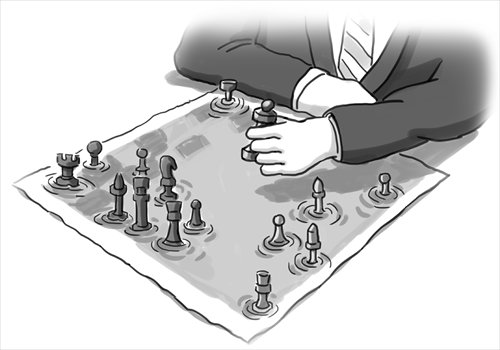

 |
| (Illustration: Liu Rui/GT) |
WASHINGTON, April 16 -- The Chinese Ambassador to the United Statessaid Thursday that China's buildup of its capabilities in the South China Seaprovides public goods to all and "serves the interests of maintaining security, stability and freedom of navigation there." In a keynote speech to the International Conference on China-U.S. cooperation in global security affairs, organized by National Institute for South China Sea Studies, Ambassador Cui Tiankai elaborated on China's policy on South China Sea in a comprehensive manner.
Cui said that China's position on the South China Sea is clear and consistent for decades. "Our position has not changed and will not change. While we are determined to safeguard our sovereign and maritime rights, we also exercise best restraint in handling disputes with others," he said.
Responding to the criticism of China's construction activities in the South China Sea, Cui said it "would be totally unfair to ask China to give up its legitimate rights and give in to the unjustifiable demands of certain parties."
"Let there be no illusion that anyone could impose on China a unilateral 'status quo', and let there be no illusion that anyone could repeatedly violate China's sovereignty without consequences," the diplomat warned.
Cui reiterated that China stands for peaceful settlement of disputes through diplomatic dialogue and negotiations, noting that, together with Association of Southeast Asian Nations (ASEAN) countries, China has proposed a "dual-track approach" on the issue of the South China Sea, in line with norms of international law and relevant international practices.
"China and ASEAN countries share much larger common interests in overall regional stability and prosperity, the bonds that unite us are much stronger and longer-lasting than any possible difference between us," he said.
On the maintenance and construction work that China is carrying out on some of the Nansha islands and reefs, Cui stressed that such work "is well within China's sovereignty."
The main purpose is to improve the functions of facilities there so as to provide services for ships of China, neighboring countries and other countries that sail across the South China Sea. Such services will include shelter for ships, navigation aid, search and rescue, marine meteorological observation, fishery service and many others, Cui said.
The Chinese envoy also explained that China's construction of military facilities in the area "is only natural and necessary" and that they are purely for defensive purposes.
"If these facilities could not even defend themselves, how can they render service to others? If China could not safeguard its own sovereignty, how can it shoulder greater responsibilities for international stability?" Cui asked.
Citing China's independent foreign policy of peace and a defense policy with a defensive nature, Cui said facts show that, as China grows stronger, it is better able to take up greater international responsibilities and contribute more to regional and global stability.
"Anyone who shares our commitment to community building in the region shall have nothing to worry about," he said.
On the United NationsConvention on Law of Sea (UNCLOS), Cui said that China, as one of the first countries to join and ratify the UNCLOS, welcomes more countries, including the U.S. to join the treaty.
But he added that the Convention is not intended to resolve territorial issues, and neither it gives anyone the right to conduct intensive, close-range reconnaissance activities in other countries' Exclusive Economic Zone.
 J-11 fighters in air exercise
J-11 fighters in air exercise Beauties dancing on the rings
Beauties dancing on the rings Attendants-to-be join Mr. & Miss Campus Contest
Attendants-to-be join Mr. & Miss Campus Contest Beijing's toughest anti-smoking law takes effect
Beijing's toughest anti-smoking law takes effect Family lives in cave for about 50 years in SW China
Family lives in cave for about 50 years in SW China PLA soldiers operating vehicle-mounted guns in drill
PLA soldiers operating vehicle-mounted guns in drill Blind carpenter in E China's Jiangxi
Blind carpenter in E China's Jiangxi China hosts overseas disaster relief exercise for the first time
China hosts overseas disaster relief exercise for the first time 20 pairs of twins who will become flight attendants in Sichuan
20 pairs of twins who will become flight attendants in Sichuan Obama is sowing discontent in S.China Sea
Obama is sowing discontent in S.China Sea Rescuers work through night to reach cruise ship survivors
Rescuers work through night to reach cruise ship survivors Driving through limbo
Driving through limbo Facing down MERS
Facing down MERSDay|Week